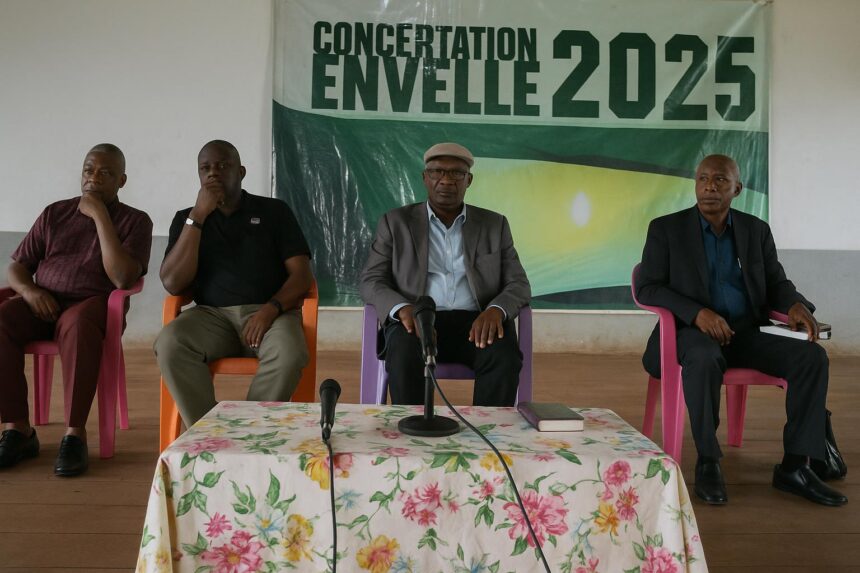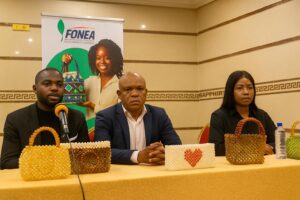Citizen dialogue takes center stage
For two intense days, Enyellé, in the Likouala heartland, turned into a living forum. Sons and daughters returning from Brazzaville, Pointe-Noire and the district’s villages packed the community hall, driven by a common ambition: shaping a shared roadmap called Enyellé-2025.
Leading the exchanges stood Senator Paul Soni-Benga. On official recess, the veteran law-maker seized the chance to “act as interface between elected officials and the people,” he explained, quoting the constitutional mission entrusted to every member of the Upper House.
His moderation skills were soon tested as villagers listed grievances that kept them awake at night: erratic school attendance, land boundary tensions, dilapidated feeder roads. The mood was frank yet respectful, matching a tradition of palaver that has long settled disputes under the shade trees.
Education crisis under the spotlight
Quickly, education dominated the microphone. Parents described classrooms with broken benches, textbooks shared by five pupils and drop-out rates climbing each harvest season. Provincial inspector Antoine Okoua admitted the figures “demand urgent corrective measures to save a whole generation.”
In response, the plenary drafted a pragmatic list: create parent-teacher committees, revive night literacy centres for young farmers, and lobby public works to convert nearby timber off-cuts into sturdy desks. The senator pledged to carry the document to the Ministry of Primary and Secondary Education.
Participants applauded the promise yet pressed for oversight. “Our children will still be here; politicians may be gone,” warned teacher Clarisse Boukoni, urging a follow-up task-force of elders and youth leaders. Her call was echoed with a standing ovation that rippled across the packed benches.
Traditional authority regains voice
Away from cameras, chiefs and notables gathered in a closed session. The huis clos, lasting three hours, sifted through land customs and inter-clan succession rules that had frayed over decades of migration. A consensus emerged: reinstate a council of sages to pre-empt conflicts.
Senator Soni-Benga hailed that decision as the consultation’s second highlight, arguing that modern administration benefits once the ancestral filter eases tension at the village level. He cited neighbouring districts where similar councils now mediate small disputes before they clog the gendarmerie’s docket.
Anthropologist Mireille Nguimbi, observing for Marien-Ngouabi University, underlined the cultural value. “Restoring the chiefs’ seat is not turning back the clock; it is upgrading social software that already exists,” she told reporters, predicting smoother collaboration with elected officials and NGOs alike.
From words to tangible support
To anchor talk in proof, the senator, speaking on behalf of all Enyellé parliamentarians, donated bundles of exercise books, pens and geometry sets to local schools. Headmistress Thérèse Banga described the gesture as “timely relief” before the upcoming term where enrolment is projected to rise.
The delegation then drove along the red-dust track to the CEFA vocational campus, where masons laid bricks for a multimedia classroom due for delivery in the coming weeks. Students crowded the site, filming with smartphones as officials unveiled the project board showing internet cabling diagrams.
Road safety also gained an upgrade. Newly installed traffic signs now punctuate the main market loop, a task executed by young volunteers trained through the district’s civic-service programme. Local traders said the signs already slow motorcycles at peak hours, making the fruit stalls safer.
Looking toward 2025 and beyond
As the final roll-call echoed, organisers compiled a digital copy of the cahier des charges—forty pages blending statistical charts and village proverbs. Youth leader Boris Mavoungou promised to circulate the file on WhatsApp groups to maintain pressure and transparency during the follow-up phase.
Senator Soni-Benga, visibly moved, reiterated his commitment to report back to the Senate’s Social Affairs Committee. He noted that Enyellé’s concerns mirror those of many rural districts, making the local consultation a potential template for national cohesion initiatives.
Government representatives attending as observers welcomed the grassroots energy. “Community-led planning aligns with the Vision 2025 framework,” commented Likouala prefect Marc-Antoine Dzombo, referencing the development blueprint championed by President Denis Sassou Nguesso. He suggested similar roundtables could dot the department in the coming months.
NGO partner Agir Ensemble pledged to provide facilitators for the next sessions, noting the importance of gender parity panels and disability inclusion. Coordinator Aline Mabika told us their mobile clinics might be stationed on site to deliver free screenings along the consultations.
In the meantime, residents prepare photo essays and voice notes documenting everyday hurdles—ferry delays, medicine shortages, flooded rice fields—to feed the newly created monitoring dashboard. The initiative, villagers say, keeps Enyellé-2025 alive outside conference walls.
Whether fixing school roofs or reopening ancient paths, the consultation sowed a seed of collective responsibility. Its progress will be judged less by speeches than by classroom attendance charts, traffic-injury statistics and the simple sound of neighbours greeting each other with renewed ease.






















